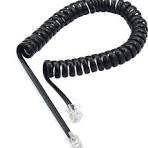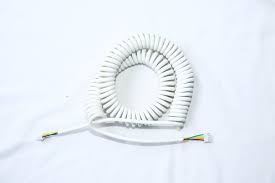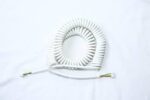A telephone coil cord, commonly known as a handset coiled cord, is a flexible, spiraled cable designed to connect a telephone handset to its base. This coiled structure allows for extended reach while maintaining a compact form when not in use. Below is a detailed overview of its key specifications:
🔧 Key Specifications of Telephone Coil Cords
1. Connector Types
-
RJ9 / RJ10 / RJ22 (4P4C): These are the most common modular connectors used for telephone handset cords. The 4P4C configuration indicates four positions and four conductors, suitable for voice transmission.
2. Wire Gauge
-
28 AWG (0.32 mm): Commonly used for its balance between flexibility and signal integrity.
-
30 AWG (0.25 mm): Offers increased flexibility but may have slightly higher resistance.
-
32 AWG (0.20 mm): Provides maximum flexibility, ideal for compact spaces, though with higher resistance.
3. Cable Length
-
Coiled Length: Typically ranges from 23 cm (9 inches) to 50 cm (20 inches).
-
Uncoiled Length: When fully extended, the cord can reach between 1.8 meters (6 feet) to 7.6 meters (25 feet), depending on the model.
4. Material and Construction
-
Conductors: Stranded tinsel wire (e.g., 32 AWG) is commonly used for its flexibility.
-
Insulation: Polypropylene (PP) is often used for insulation.
-
Jacket: Polyvinyl chloride (PVC) provides durability and flame resistance.
-
Connectors: Modular plugs made of clear polycarbonate (UL94V-2 rated) with gold-plated contacts for corrosion resistance.
5. Compatibility
These cords are universally compatible with most telephone brands and models that feature a standard RJ9/RJ10/RJ22 (4P4C) jack, including brands like AT&T, Cisco, NEC, Rolm, ITT, and Tie.
🛠️ Example Product: Uvital Coiled Telephone Handset Cord
-
Length: Coiled length of 0.72 feet (22 cm), uncoiled length up to 4.5 feet (1.4 meters).
-
Connectors: RJ9 4P4C on both ends.
-
Material: Made of pure copper for improved conductivity.
-
Compatibility: Suitable for various telephone brands including AT&T, Cisco, NEC, Rolm, ITT, and Tie.








